





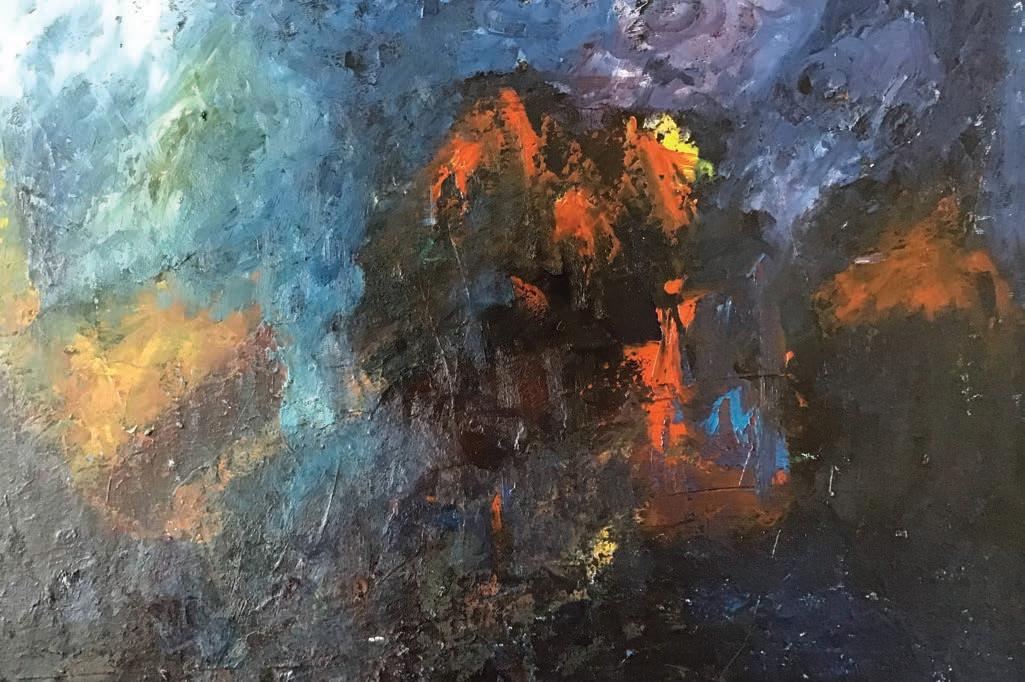
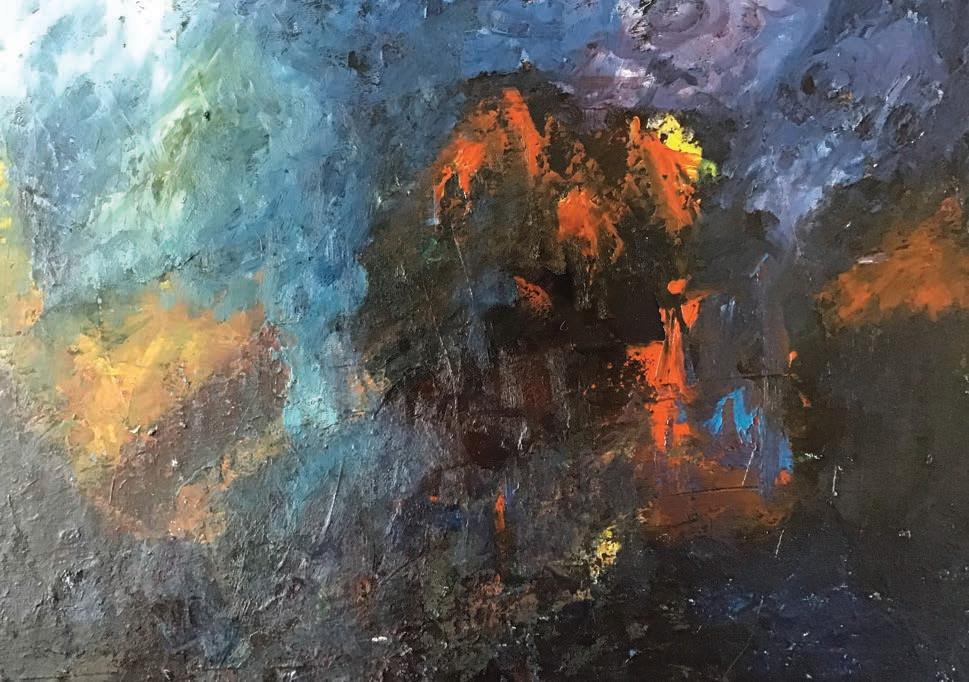
Asleep on the Volcano The Poetic Landscape of Psychotherapy Marcus Price Marcus Price Asleep on the Volcano The Poetic Landscape of Psychotherapy 9781 838136901 ISBN: 978-1-8381-3690-1 RRP £29.99 Asleep on the Volcano is a melting pot of poetry, painting and psychotherapy. It depicts the authors own essential disturbance and recovery from working with persons who have su ered injuries of the mind.
End paper on uncoated white paper (blank)
End paper on uncoated white paper (blank)
End paper on uncoated white paper (blank)
Asleep on the Volcano
The Poetic Landscape of Psychotherapy
Marcus Price
Of all the remarkable poems in this book it is ‘ e Face’ which sums up for me all the aspects of Marcus´s creative and professional life to come. Written when he was still a very small boy, ‘ e Face’ is a profound and visionary poem for one so young. Marcus vividly painted a portrayal of his fearless confrontation with a disturbing illusion that was as actual and vital as that same force he now spreads upon his canvas.
Anne Westley, Artist and Author of Relief Printmaking: a practical printmaking guide for artists and students in the UK, Australia, USA and China
Reading your book, it’s clear that you discovered the power of language at a remarkably early age and had the prescience to record it. It’s fascinating to see the development of your gift with words. I am left with the feeling that I have spent my life observing the world rather than digesting it.
Your paintings are invigorating! ere seems to be a constant struggle between early German Expressionism – Kirchner/ Kandinsky/Beckmann et al – and Pollockian American Abstract Expressionism. Aus dem Sturm strömt Licht!
Steve Stevenson Film Editor
vi
Marcus Price - an artist whose work feeds the soul, encourages understanding and empathy, gives dark visions a voice and hope. His work a ects the world, and those who experience his work, for the better.
Mabelle Pañalver - Poet and Psychotherapist
Art is brave, Marcus says in one of these poems (p. 17). ese poems and paintings are brave and visceral, o ering “a sense of understanding and acceptance for which the environment is hungry.” Sometimes described as “poetic tapestries”, these writings draw on dreams of sullen light and unrelenting beauty – often striking, painful and perceptive: “the sheen of your intent” breaks through the “Puddle” revealing the violence of “Subordination”, the wit of “O the Trolley”, the despair of “ ey Took Her.”
vii
Natasha Morgan -Author and Gestalt Psychotherapist
Asleep on the Volcano
The Poetic Landscape of Psychotherapy
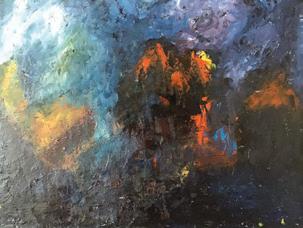
Marcus Price
Written and illustrated by Marcus Price
Published in the UK by EPI Community Publications August 2020
ISBN 978-1-8381-369-0-1
Copyright © EPI Publications 2020.

All rights to the content of the book belong to EPI Community Publications and cannot be reproduced or copied without permission of EPI Community Publications.
All rights reserved. No part of this publication may be reproduced, stored in a retrieval system, or transmitted, in any form, or by any means, mechanical, electronic, photocopying, recording, or otherwise without the written consent of the author, nor be otherwise circulated in any form of binding or cover other than that which it is published and without a similar condition being imposed on the subsequent purchaser.
A catalogue record for this book is available from the British Library.
Translation into Italian by Francesca Guiseppina Bascialla (p. 45)
Formatted, printed and bound by www.beamreachuk.co.uk
x
ank you to Teresa von Sommaruga Howard and all the members of the art discussion group for encouraging me to publish these works and to my patients who are a constant source of inspiration.
xi
Introduction
Asleep on the Volcano is a collection of creative works. It depicts my own essential disturbance and recovery from working with persons who have su ered injuries of the mind, many of whom have had little choice but to enter psychotherapy from the ruins of their experience. ese metaphors for my own journey were crafted in the hours between sessional work with forensic patients, most of whom have been given medication to stabilise or
dissipate their symptoms and who live with an uncertainty as to when restrictions on their lives can be lifted, including incarceration. Patients who might struggle with personal histories that for many of us might sound unimaginable, often experience the profound humiliation of a life in tatters.
1
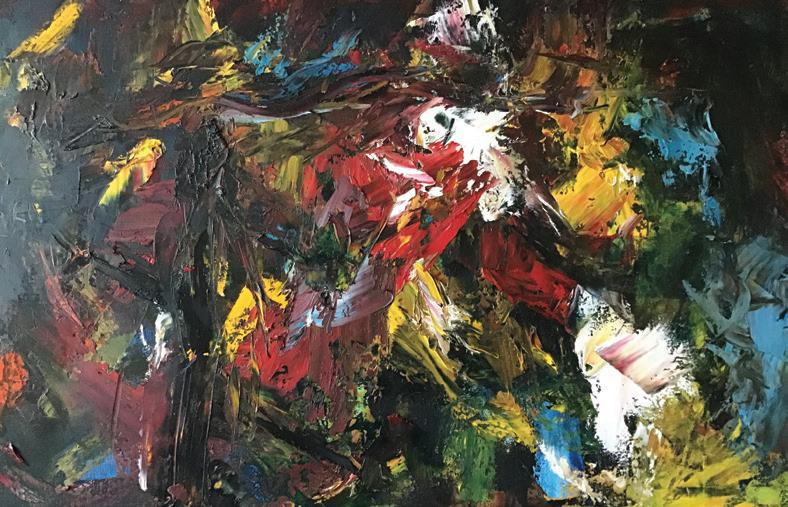
2
The Poetic Landscape of Psychotherapy
Poetry is united with psychotherapy in the conveyance of emotion through words. e depth of understanding that Sigmund Freud, the founding father of psychoanalysis, explicates, with his invitations to free oating attention, free associationand analysis of the dream, concords to the complexity of poetry. My own poemshave been written down and recorded from the age of ve. eypreserve memories of my emotional being across the years, and to some extent are the preservation of my daydreams. Sometimes I will cite a poem quietly to myself not unlike a musician humming a tune. Whilst music speaks to us of the age
it was written (Robert Schumann the Romantic age, Bob Dylan the 1960s) there is also a timelessness in the deeper layers of art, for example, the vibration of string or the shades of tone and shifting rhythms. e early experience of our mother’s voice, being rocked in our mother’s arms and other such resonances of deeply layered moments are the foundations for empathy and relationships. e ingredients of poetry are the lifeblood of the human mind and psychotherapy. Sometimes the following poem comes to my mind when a car passes me on a country lane. I wrote it when I was 12 and it
brings back memories of my 12-yearold self, but also the roots of my poetic self. Whether I had actually seen a cart on the high street where we lived or not is unclear to me. I am certain that I often listened to the fading tra c as in the 1970s there were substantially fewer cars than nowadays. My mind here quite easily switches from poetic thought to psychotherapy. How busy is the tra c in my patient’s life and what was the quality of tra c on his or her journey? Where were the accidents? And where were the spaces to re ect and gather meaning?
3
Morning
In the morning misty fringe
When sunless light reveals the outlines of colourless objects, e lorries and cars whilst mumbling, roll forward to view and reveal their complexities. ey rob the morning gift of silence, blending with the twitter of bird or the occasional voices of distant chattering men and women,
But to hear a single engine fade away, to brie y leave a stretch of silence,
Enhances a poet’s thought.
Yet if a cart were rumbling there, many a person would stop and stare and listen to the beat of the docile beast with his ears erect, proudly pulling his groom.
I wonder if a poet’s mind would spring to life upon this morn?
4
I was a country boy raised in a village in Essex that borders Su olk. I wrote poems that were inspired by the countryside that bathes under the magni cent East Anglian skies.
Sky
A pyramid of rays plaiting the skies mottled edge softly land upon the deep green wood, A hawk descends to the distant grey, Again, my head is raised and there I see a mountain, e sun’s descending features shooting down its mighty cli and piercing its dark belly gold.
5
Like many children born in the 1960s I was brought up on a diet of war stories that were enacted in our playground games, the preparation to ght fusing developmentally with a sense of my own masculinity. In the following poem there is struggle between two worlds as the ghostly transgenerational trauma of war fuelled my imagination. At the end of the poem the ghost army instantly evaporates at the real touch of the cow rasping my hand with its tongue.
Dead Men
Crumbling earth beneath their feet
Soldiers march horizon deep
Big eyes stare and I stare back, only the cattle know I’m here, Across these English undulations, reams of ghosts disappear. And nature waits and nature knows, e silent rook, the rabbits le along their holes, e wind gently bows, All but man.
e cattle huddle by the gate, nervous of my touch.
e sun dazzles, I strain to see the soldiers, But focus on a oating white u and only hear a distant bugle, or a bird.
A hare ies across the eld,
e cow rasps my hand,
e dead men, dead.
is was as instant as a drop of dye dispersing in clear water, ‘the dead men dead’. It was written not too far from a disused World War Two aerodrome.
6
A similar divide between two worlds, one ghostly and haunting and the other secure can be seen in this even earlier poem, written in my bedroom at primary school age.
The Face
I saw a face one night,
e light was only slight as I stared in bed at the ugly head, I may have been scared as he glared with a motionless stance. e thought of fear came nowhere near, his crinkled expressive eyes.
I gripped a feeling that he was concealing the key to another world, Yet in desperation his one-track soul was aching to pass on a message that he could not tell. Movement was scarce with me, but my straining eyes could not see one twitch on the face which they glowered, en changing to worldly thought, the vision was gone and my dark surroundings changed from gloomy talons to home.
en a question appeared, Which world was real?
7
In these early poems my young mind is aware of a shadow world but is able to return to a safer reality as represented by the cow’s tongue and home. is
safety for me was embodied in the Essex landscape:
The Oak
e oak like a father stands before scattered survivors
A silver water re ects its light through the branches and mud scales crystallised like coastal sand rear to the distance, From a grassy bank to brown mounds harbouring silent foxes. en further still to the dreamy oasis, lost from shadow but a rising silhouette from horizons fall, Source of the sky that stretches to the lonely trees and comforts them, Tidal from the destination of undercurrent land.
8
The Forensic Patient
It’s interesting that our eyes have sharper vision at their periphery. Sometimes the more we try not to look at something the sharper an image becomes. is is sometimes apparent for the forensic patient who might have the strongest of reasons not to focus on their life’s events.
e more they lack the capacity to see and face the scenario of their crimes and victimhood, as they always carry both, the more likely they are to re-enact the dreadful de ning moments of their lives. Such individuals can convey a sense of being depleted or incomplete in some way. is is not just to do with the drugs they take, illegal or otherwise. It is sometimes due to extreme experiences that have been severed o or deeply
buried from consciousness. ese experiences are destined to re-surface, sometimes in the form of symptoms in what Sigmund Freud called, ‘the return of the repressed’ (Freud, 1915d p.154).
It is essential that a psychotherapist manages to allow disturbance to surface in his or her own mind and to survive this process. Re ection is sometimes studiously avoided as it is easy to become too busy for any brief stretches of silence that could enhance a poet’s thought and di cult feelings must remain buried. is dangerous situation can be depicted in the metaphor asleep on the volcano.
Pre-Socratic philosophers in the fth century BC used to meet on volcanoes. Volcanoes were seen as portals into the underworld. e poet and philosopher, Empedocles, was thought to have thrown himself into a volcanic crater believing it would bring him eternal life (Kingsley, 1995). I think the psychotherapist’s task is to peer and assist others into peering safely into the volcanic crater, hopefully without sending ourselves insane. ere is always potential for an eruption and the histories of forensic patients can sometimes seep into atmospheres like noxious gas. Psychotherapy for some patients may represent their rst encounter with a receptive mind that can tolerate
9
rather than extinguish the heat of their experiences. We can sometimes be aware of layers of harrowing facts about our patients’ histories, such as, “You were taken away from your mother as a baby as she was a heroin user. Your stepmother colluded with your stepfather to sexually abuse you. You were taken to a children’s institution and also abused there. You were sent to a young o enders’ institution at the age of 15 for robbery and ghting”. e implications of such histories are far reaching. ere may be a di culty in distinguishing between dream life and the real world, the literal and the symbolic. With such horri c events, nightmares become a waking reality with little refuge from the su ering and little idea of how to receive help. For such patients the experience of an oak tree father, the rasp of a cow’s tongue, a secure home, comfort or the valuing of imagination
or emotional needs might seem hard to imagine. Such individuals can present as ‘o the wall’ or almost totally ungrounded from reality. Other times they may appear to retreat into a grandiose identity whereby they can become the prince of thieves, the chief drug dealer or gang leader. ‘Don’t mess with me!’ e harrowing crimes to which they have resorted can be seen as attempts to resolve inner turmoil, to nd relief from the morass of emotional destruction from which they have never managed to separate. is is a search for something real and not just imagined. e atmospheres that pervade such experiences are trapped and sometimes boiling below the surface, leaking like a vaporous gas, and those that come too close for too long can appear intoxicated.
Most patients who present for psychotherapy with severe diagnoses have been in the psychiatric system for a long time and will be taking medication prescribed to them. It's quite possible that psychotherapy would be hard to start without such medical containment. However, it’s also possible to use a diagnosis as an excuse to stop thinking, ‘He’s got that so that’s why he behaves in this way’, like a high wall that can be forgotten about, as the patient, ‘Ain’t ever scaling that’. ere are many papers and books in psychotherapy that work with patient categorisations, and whilst these are often helpful, individuality can also become lost as patients don the cloaks of their diagnoses and occasionally, what is set out as good intention to elicit truth can become the language of disguise and an excuse never to change.
10
It is not uncommon for patients to appear as needy children, expressing the early nature of their disturbance in their bodies, in the only way a baby can before the mind has developed verbal dexterity. Regression to such injurious states can be a necessary process in psychotherapy. It was the eminent psychiatrist, DW Winnicott who helpfully informed us that where there is delinquency there is hope (Winnicott, 2011). People with criminal convictions have sometimes convinced themselves of the futility of protest, the transcendent terror of their own anger. Poetry and art are higher forms of protest. e following two poems written in my mid-teens represent my own distress and protest at the institution of school.
Teachers, teachers, a name to caress my brow, eir heads are big and their hearts are small, Oh, if I could throw them all in the deepest pool, I would, If I had not a human heart.
11
Certificate Presentation
Let this evening be, Organised informality, I’m bored already,
Pickled rows of respectability, in judgment and looking forward to their cigarette, suits, perfumes, ties and façades, Every other life a wreck, And crept from many simple homes, the tears, the worries forgot, unknown,
And the note which handshakes tell Englishmen,
Stand proudly before lighted Tory panels,
Live bene cially,
Lie,
Ignore the lesser,
And become in your headmaster phrase, ‘Credible’. And may the world step back in educations praise,
God bless,
Please stay for a cup of co ee.
Clap! Clap! Clap!
12
Psychotherapy is fundamentally about intimacy and the human need to be in relationships. e desolate cul-de-sac that underpins the contemporary diagnostic expletive, ‘narcissism’ is profound.
e developmental transition between childhood and adulthood is derailed
when a young person faces this alone. e next two poems written in my twenties are about surviving feelings of loneliness and alienation.
Breakfast Bagpipes
Naked, Launching melodies from the bathroom, With breakfast bagpipes, A Scotsman owned the green expanse, And when the park met little roads and little road amassed grey, e drowsy hum of woken dream Wrapped in daily course Hippies, hob-nobblies and delicate child, Shy from my stare and the bagpipes in my head.
13
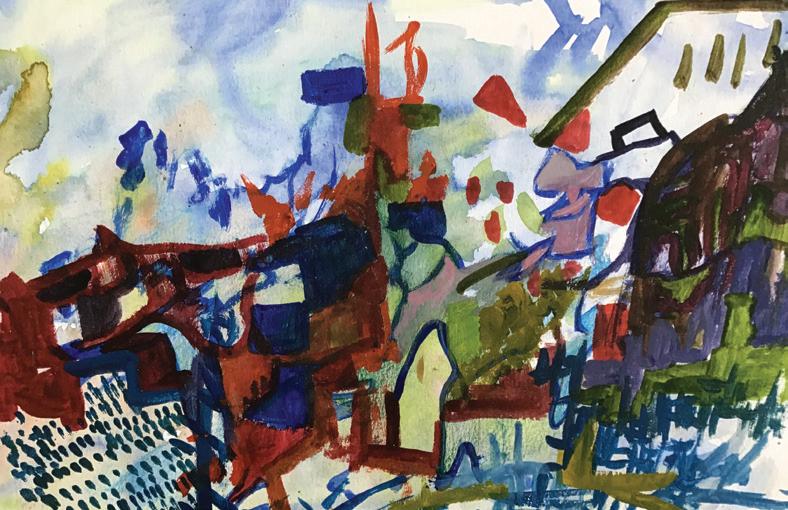
14
A Day
I opened a box
It smelt of babies and dogs
It had an English dictionary a Bible and a television.
I went home
Laid in rubble
And watched sunny squares on the oor.
I was led to another box
a stark cold gure of breathing brick
Here inside a lifetime’s smell, neat objects, clean carpet, plastic trophies on shiny Formica
I sat down
A foreign body ltering into the television
Nibbling junk food
Trying not to fart
On leaving e sky was an awaiting world
Red and bleak
Peaceful yet cold
And with falling evening I passed it
Towards the pub.
15
In our personal psychotherapy most of us can probably resuscitate ourselves drawing on good attention we received as children. In di ering degrees, this good experience can be mobilised for our recovery from the parental “fuck up” to paraphrase Philip Larkin. For some though, helpful human contact was sparse or absent and ghostly gures may people their minds in the absence of real human beings. Such patients struggle to work symbolically as there is a lack of what some psychotherapists call an ‘as if’ quality in the way they relate. is paucity of relational understanding is a result of being treated or used as a concrete feelingless entity in childhood which is now reciprocated in adulthood.
Psychotherapists working with such patients need to nd ways of understanding their own destructiveness. We can easily become casualties of our own self-importance, self-righteousness or in ated expertise in the face of those for whom life seems ruined and impossible.
It is easy to slide into dehumanising attitudes when our own fallibilities are denied. Perhaps for many mental health sta , there is nothing more terrifying than becoming a patient. For the psychotherapist being a patient is obligatory.
It can be tempting to entangle ourselves in tribal rivalries that are stoked by consumerism and the apparent need to
defend our positions through research, so much of which has recently been exposed as corrupt (Dalal, 2019). e endeavour to sell ourselves can increasingly take us away from the work we are here to do. We might nd ourselves covering the wounds of our patients rather than giving them air so that they might heal. A poem is unlikely to xate on symptoms that sometimes dominate and freeze our understanding. e making of art is at the core of our human condition and can be a liberation from the strictures of our prescribed roles, the archetypal pull of the therapist – patient relationship. It is the poet who teaches us how to face the imprisonment of our souls.
16
Art Matures
Art matures
But childhood is closest to the heart. From an infant’s rst tear, Fear is the moon’s snookered darkness, e suspended shock of truth, Pain’s preparation. Art is brave, It’s safer to blend in crowds like trees and live entertained to be tamed, Or does safety lie in ideas beyond ability? Remember, You were lost from the Mother’s womb and loved by her.
17
Patients are sometimes unable to nd a narrative or even a mind for the disturbances they carry. Such events can sometimes be literally unspeakable. It is this pressure of the unspoken that ripples through the often destructive cycles of their lives. In the psychotherapy space there is a tension between two options, to wake up to the unconscious determinants of our behaviour and work towards the analysis of our dreams, the “Royal Road to the Unconscious” (Sigmund Freud 1900) or wipe out our dreams and embody them in an enactment. I can
often see a correlation between processes in my work environment and their deep penetration into my own dream life. is knowledge can be thought about and enrich the supervisory process. In psychotherapy, a perpetrator can sometimes access their own victimhood in the chain of tragic enactments. Some criminal acts can be recognised as failed and sometimes perverse attempts to break free from an isolated state of mind. Perverse scenarios invade the dream life of psychotherapists and patients alike
and these can be experienced as night dreams. e poem can modify these into waking-pictures that can be held and thought about in re ective rhythms. e psychotherapy space is a sort of assisted day-dreaming space. A few poems near the end of this collection ‘Alienation and Perversion’, ‘Dreams’ and ‘Shocked’ were composed directly from recorded sleep dreams sewn together as poetic tapestries.
18
To Sleep
Reaching into unknown worlds
e curls on the back of your delicate neck
Point inwards and have no external gaze
Innocently they gather as leaves in the old garden gully
Too tired now to bend and sweep the rumpled ground
Nestlingin the sullen light of nature’s unrelenting beauty
And yet ifthe tendrils of a ru ed time
Were sending messages to this rhyme
Forbidden as a poet’s lisp
Soon all cares shall drift this way to sleep.
19
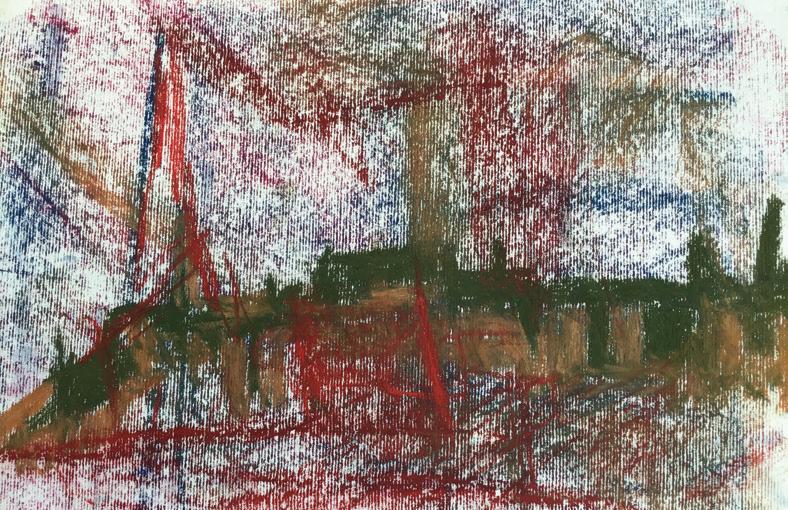
20
Effigy
I awoke to an e gy
Led by the hand
rough a dark canal of dreams, that fell still on the plains of the wild world
In the steps of ancient harmony
A heavy burden
Arose as a row of iron girders that led to our only gate
Our heads lifted to their great power
Looming omnipresent
With small cameras, nipples just out of reach
Our freedom mistaken
But in the subtle seeds of nature’s air
Brie y swept from the cold sweat of my mother’s body,
In deep breath
Never loved
But at least as this memory hovers
What breath I have
Cannot be taken by the crazy voices at slaughter peace
And brain us for brief release.
21
Under The Same Sky
Under the same sky
Flanked by sanguine peace
In a u y draft of words
Relative to a delicate moment
Shored by the heaving beaches of nature’s frame
Under the same lens of judgement e same stuttering disbelief
In the basement we sit
Like shackled siblings
Fumbling in the rst light
Dribbling our pretence
With food a lust unsatis ed And love a mumbling crime.
22
Our Eyes Meet
What movement shapes our frail desires
e bold transitions of your face
e keen breeze that shapes your hair
Where cold ears shadow numb contempt
A will stays here
Whilst all things melt bones crumble
Breath of the living dead
In putrefying fears that possess our passing
All nerves uncut
Shut into the pale gloom
Where your eyes meet mine
23
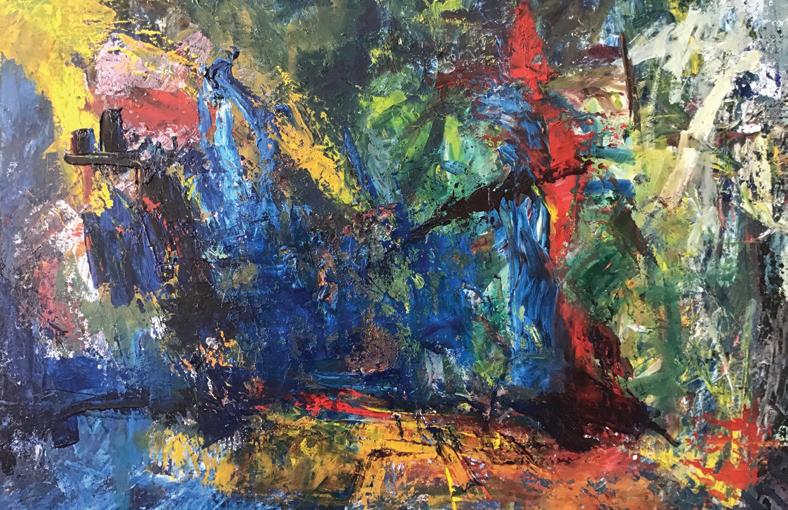
24
The Golden Mushroom
We gallivanted to the wood
On dreams of fellow women
It was by chance we saw it there
A mushroom made of gold
So rare a nd it staggered us
And trusting to our fate
We left it as a shrine
To all the days we’d trundled there, in fellowship entwined
Day by day our mushroom grew
Till there among the leaves
It proudly sprouted several more
So we could gather these
Our mushrooms took us to the stars
To heaven and to hell
Each day we tripped with sodden boots
To look for more among the roots
25
cont ...
We shouted out to passers by
We’ve found a mushroom rare!
Some did not believe and others didn’t care It was only fools that foraged in the wasteland that was there And when the time which suited us was left to winter’s frost
We trusted to another year to nd our mushroom rare Deep down we knew our chance had gone
And now alone I wander
Where once with friend I walked
And mushrooms come and mushrooms go But never will I see again, a mushroom made of gold
26
Old Age
e lingering shadows of an evening sun
Slip across
e coarse rusty pages
Of the library that gave and stole your voice
Remarkable still
Is the sheen of your intent.
27
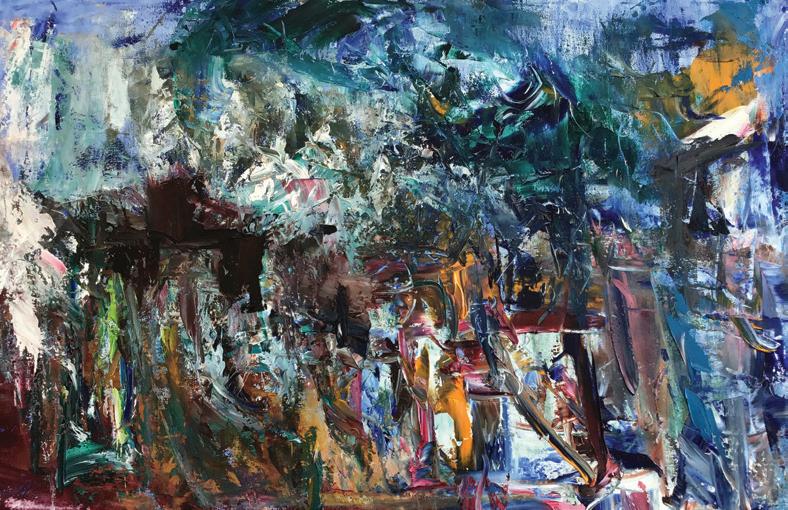
28
Death
A skewed note
Misplaced
Unready
On awkward nerve
When all toasted words
Blanket sleeves and woolly gestures
Surge into dreamless anticipation
29
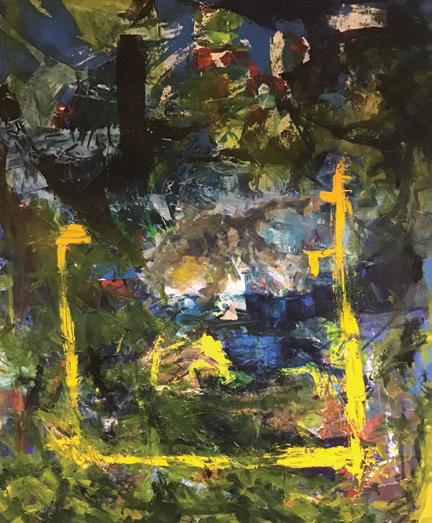
30
Death
Yellow tipped dragon y
Asleep upon the bush, that wavers as the tremulous old man’s hands
Outwitted at last, by the call of birds at dip to taste your end
A future seen
On the shady path of the echoing green Where life upon a centuries voice Falls down to this short moment.
31
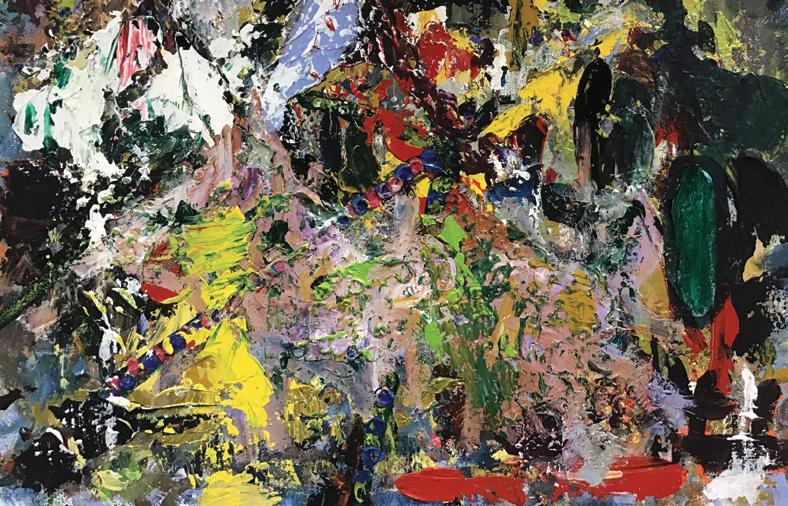
32
Carry Me
Carry me to the stone at towers above all mountains
Carry me to the monument of all su ering
I know that you sit poised above the clouds
And rooted in the earth
Like a javelin that slayed all hope
Symbol of symbols
Blunted in earth's ery mind
Carry me now
Waiting is cruel
Carry me across the eld of blood red poppies
To the cold clutch of death.
33
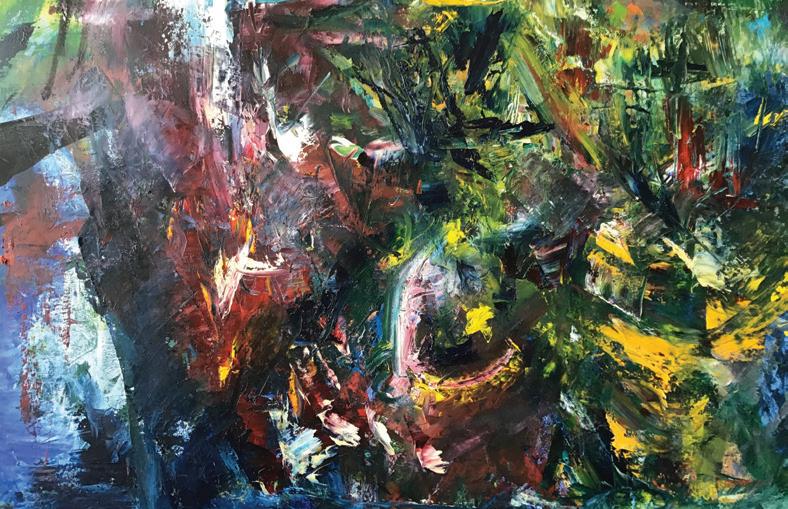
34
When I Wake Up
When I wake up
I hope that pictures will illuminate my face
In dappled light at emulates the cool drench of gentle fountains
And that pain
Will divide itself among the broken leaves
Idly scattered, where bumblebees and buttercups nurture the very core of me
And like a tree
I can stretch unfolded
Desired by the many owers.
35
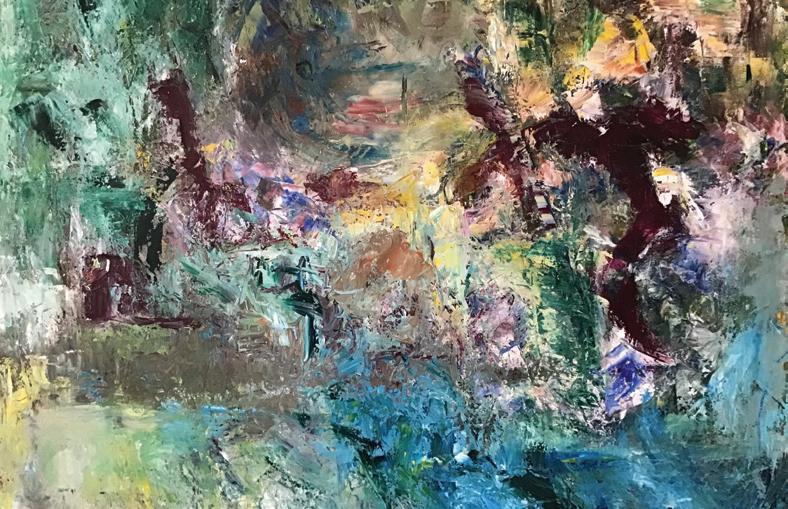
36
The Short Corridor of Time
ose who are already ghosts
Will not linger when they are dead
But in the shadow of a memory
Locked into the mocking gibbet of this tie
Just out of sight, I will whisper into the ears of strangers
37
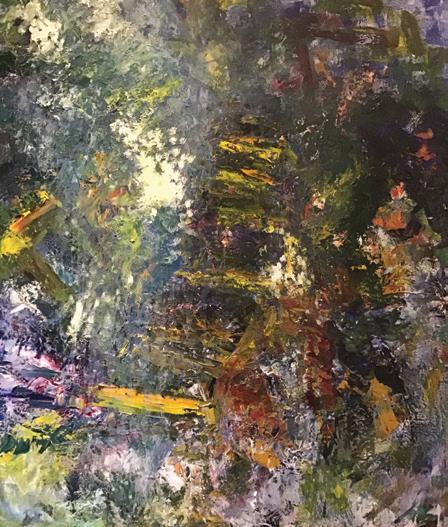
38
Monument
A child was smacked
A child was beaten
And now as a monument
e ice cream like a fallen steeple
Melts into the hard unforgiving road
Feathers unveil a moving sky
As taken to a lovely place
Denies the road its cruel embrace
And dancing shores the full desire
To cuddle friends beside the re.
39
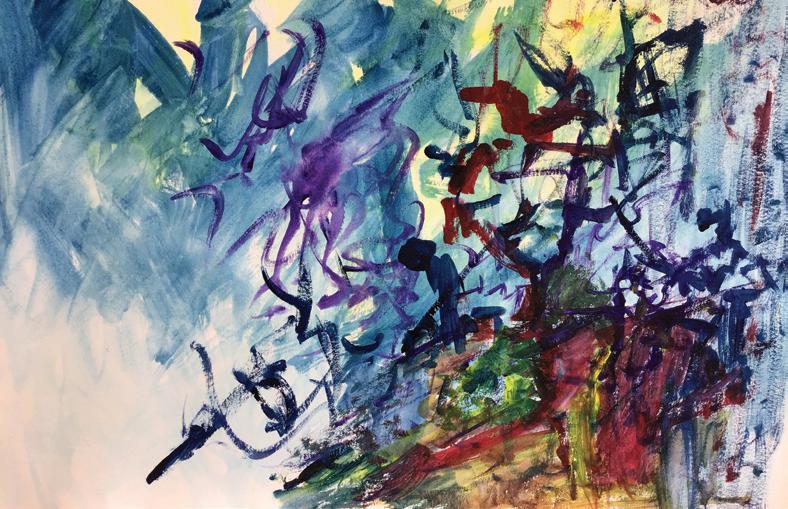
40
ExileDerailed in tumbling fate
Aloft this dreadful tribe
A transcendental remnant of your home
Softly speaks through the tip of your nger
41
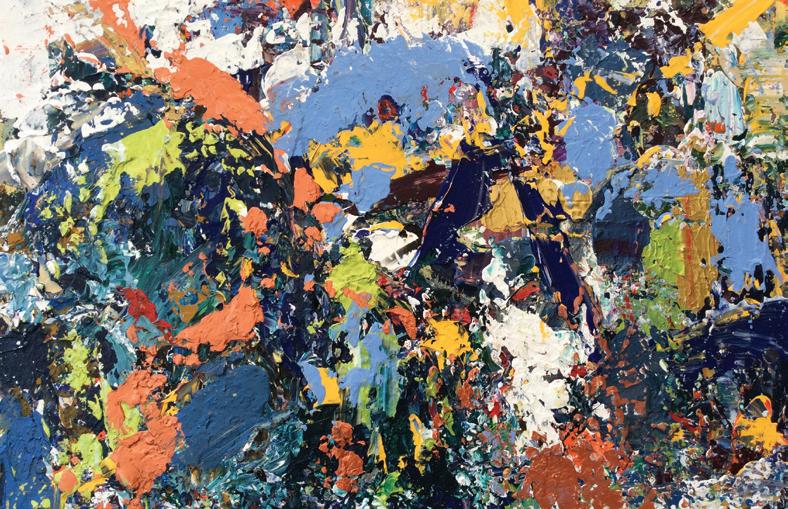
42
Birth
Bludgeoned by a meteorite at blocks the door
As no emergence from this perpetual baptism
Can free us from the fumes of discontent
No blackbird sung to a sky white frost
Can shake the foundations of this cage
Please pull my frail ankles
So I can be born
On Alpine air of innocent eyes
Convulsed from the underworld of darkness.
43
Tilt Me Forward
Tilt me forward
From the reminiscence
In your sigh
Dare I seek the sultry heat e tip toe of desire
Fought and thrashed
Until the slow brushstrokes of regret
Twist divinely in your smile
Pay me now
With stout indi erence
Aside from the maelstrom of dangerous wonder e mistake that gave us birth
44
Inclinami In Avanti
Inclinami in avanti dalla reminiscenza nel tuo sospiro oserei il caldo afoso il desiderio in punta di piedi
Combattuto e abbattuto no alle lente pennellate di rimpianto
ruota divinamente nel tuo sorriso
Pagami ora con forte indi erenza separatamente dal vortice della pericolosa meraviglia
L’errore che ci ha dato alla nascita
45
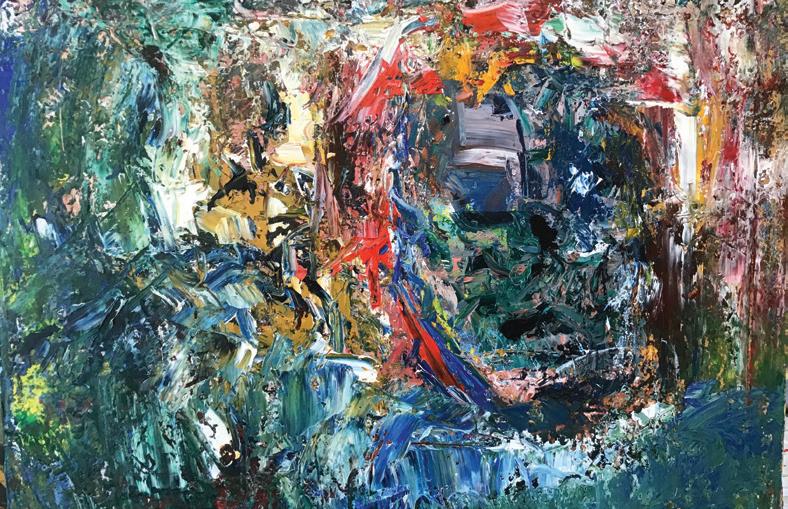
46
Despair
We ploughed into the remains of your eeting nightmare, Obscure in the rift of smoke, at congeals in the torment of your fated face e stolen years stacked in shafts of drunken dust Blistering, apping, scrambling, slurries of pointless misery, Entangled sketches dumped on inconvenient paper As the weeds of bureaucratic print Bleach and depress your direst dreams Buried long ago in su ocated screams.
47
Forbidden Tears
Yesterday's co ee sloughed in a poorly fettled mug of reception
Congealed as the bags under your eyes e future trips itself
As though time were the stone of earth
Neither gonenor to be
But here at last
In the thickening hues of a rmation
Your Shouldersdie
To the sullen face at swells and brims with tears forbidden
48
Hypno Biker
You’re feeling sleepy,
Look deep into the past,
Little green stamps licked into your co-op book,
Deeper
Deeper, A kick-started motorbike gurgles in wintersfrost,
Deeper
Engines strain
Deeper, Engines roar, Deeper
Distant voices, Deeper
Deeper, A winding river full of reeds,
Deeper still, e blinking eye of a pu ed up sparrow, Awkwardly now, Trousers split, to the crowd of retribution,
49
cont ...
In the road, you awake.
I notice the many directions of your broken ngers, And the huge frantic man
Pumping
Pumping
Helpless, on your corpse.
Further down, e road of oil and blood
Your girlfriend was turned to reveal a trendy logo on her top
Flimsy and ripped, She began to howl.
Further still,
I met the stranger
And lost from the paramedics trembling hand
A bloodied rubber glove rolled past us, Like a leaf in the breeze, “I just kept walking” he said, “I’m a nurse” I replied, Doubting my words, ere was nothing I could do.
50
Raw Material
Underneath
e aky dew of your evasive eyes
A torrential dead river courses like a dreadful army
Abandoned to the dry hammer headed clock
Tock tock tock
Convulsing with your breath
Tock tock
Tick
Did you know?
Did you grow?
Crown
Hammers hanging head
On the rise of silence
And the sinking tock of the thudding block
Stupid stupor frozen lead
In the crypt entombed
With nothing said.
51
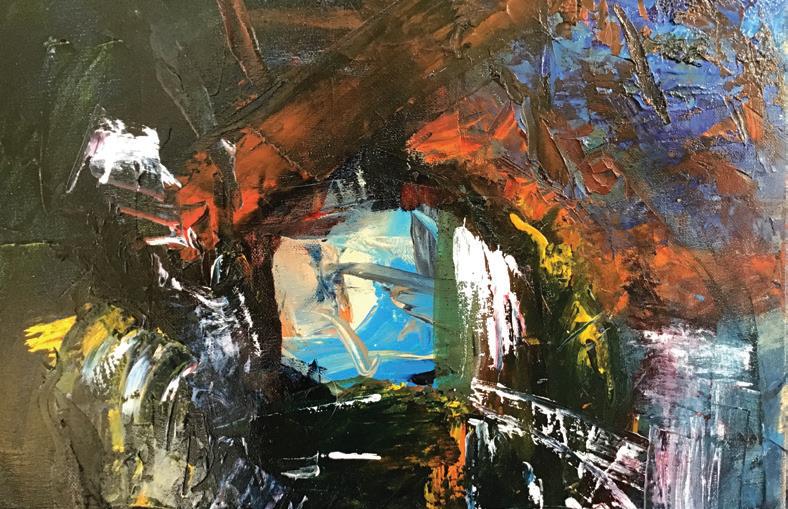
52
Baptism
e little girl was afraid to move
Unable to peek behind the curtain
Where convinced she was of the baying crowd
And the sea of vengeful eyes
To pillory her like Joan of Arc.
And yet with one feeble step
She fell into the river
To the clapping hands
And the winding rhymes
In the shimmering mist of an ancient sea
And the same crowd forgave her
With eyes of fabled love
53
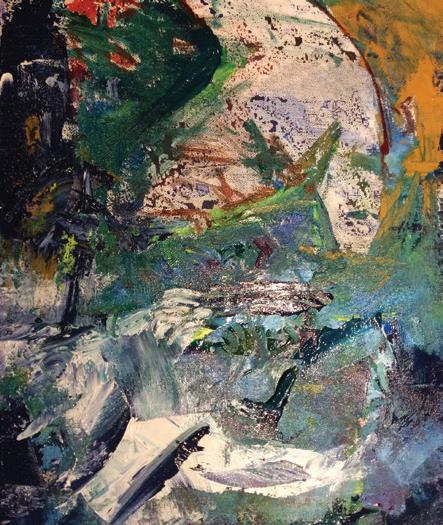
54
Puddle
Glistening in the dying light
On the cold breath of dumb boots is queer mouldy sludge
Reaps a weak familiar pause
Diminished in the exchange of sun and moon
One part food one part dirt
Frozen once a year
On that spot where I was born
55
Cry to Sleep
I awoke and saw magni cence
e ocean of providence
Alive upon the puddling beach
With ippers and lilo cracks of thrilling sand
Safe from the deep heaving tide
Prepare me nurse
With your heavy metal buckle
And your goblin feet
Cry to sleep
Cry to sleep
56
Darling
Darling
Yes dear
Outlandish are the colours of your bruised skin Cover it now Lest all will stare and we will no longer live happily under the Emily tree Or Mummies skirt that protects us from the boiling sun and the phantoms that sneak greedily into our esh.
As the sun brie y tips the corner of your mouth Radioactive termites
Flop you onto rugged rocks And squash you between insigni cance and God.
57
Northfield Hospital
Sedation slaps my numb edges
Deep into the last drops of generosity
And into frailty
Till all is lost.
58
Guilt
Gulp your tablets
Like a burbling wash of corduroy mix
Not knowing which garment
Like toothpaste that
Chokes in particled oblivion
e lungs of giant whales
Whilst declining slowly in this blood-curdling trance
Filthy guilty faces
Pressed in poisoned silt.
59
Love
Fire! re!
Illuminate all so that we can love
Not derelict in the eeting corridors of debasement
But oared in the great waters of life and death
So the thunderous alchemy of our hearts
In the deliberation of your trembling breath
Meets the sweet caress of delicate lips and explodes into bountiful sleep.
60
Subordination
Respectfully slung
e decayed apple missed the bin
And rolled beneath the desk
As enters the o ce ghost
To witness to this mistake
e perfumed spirit of discipled etiquette
Synchronised and divine
To punish the brazen
And disgraced among us
Where dreamy fatigue
And life a sti ed task
Is shafted by a boss’s beam
If only this once I had not been seen
As I dive to clean to clean to clean.
61
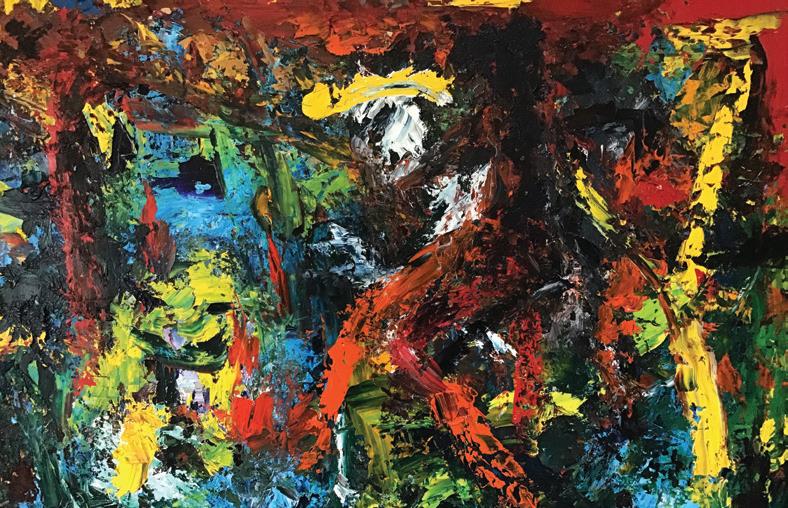
62
Off the Trolley
e man behind me must have been born here
He watches for the ritual of the nurses whom he guards
Like the overseer of an execution, his tracing eyes expect precision is authority he has come to bear
e daily drawing of a perfect square.
Like a mad mechanic in the bonnet of a car, I doze and grip and stare,
What’s the other name for that?
Obedient eunuch, spastic muscle, plastic soldier on a rubbish dump, Ahead full of pills on a trolley full of dust, Dying to be safe, without trace.
Where’s the amulsulptultriptoepinevavarin?
I’m going now, help yourselves.
63
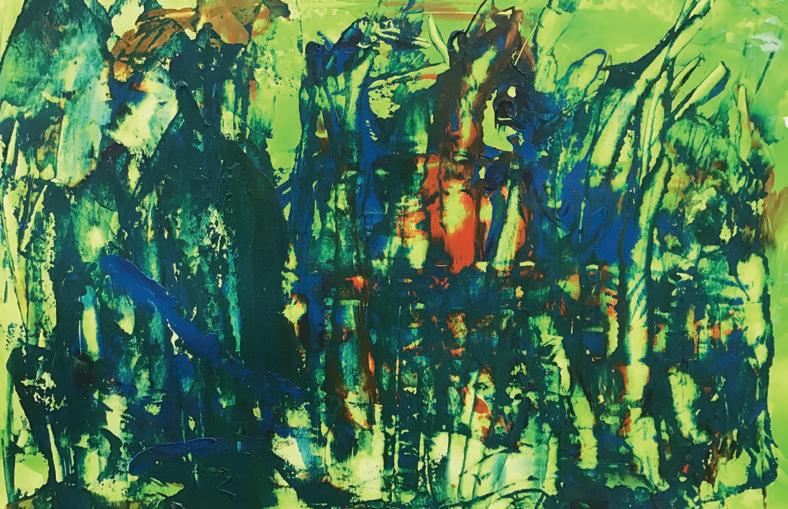
64
They Took Her
I really have no clue
Blind
Total incompetence they took my child is poem is thin
Pale No edges but if it were stretched It would reach into an unknown space
And maybe there
My baby’s face.
65
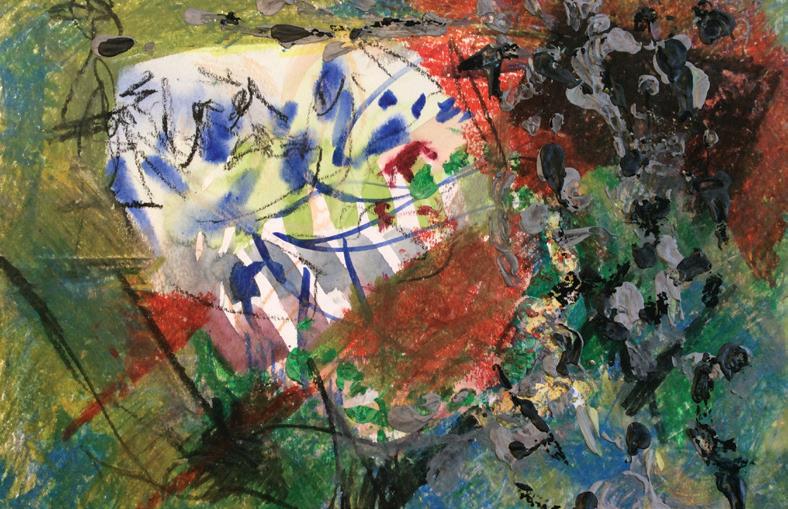
66
On Mountain Steep
On mountain steep ere was a sheep
Who crawled behind a wall
She’d dreamt of chewing daisies at were growing fair and tall
In time the grinding wind at growled into a gale
Left the little sheep
Pale and drab
And daisies were a wire of barbs
Till sleep became a slumped farewell
And in the distance rang a bell
Farewell Farewell
Little sheep on mountain steep
67
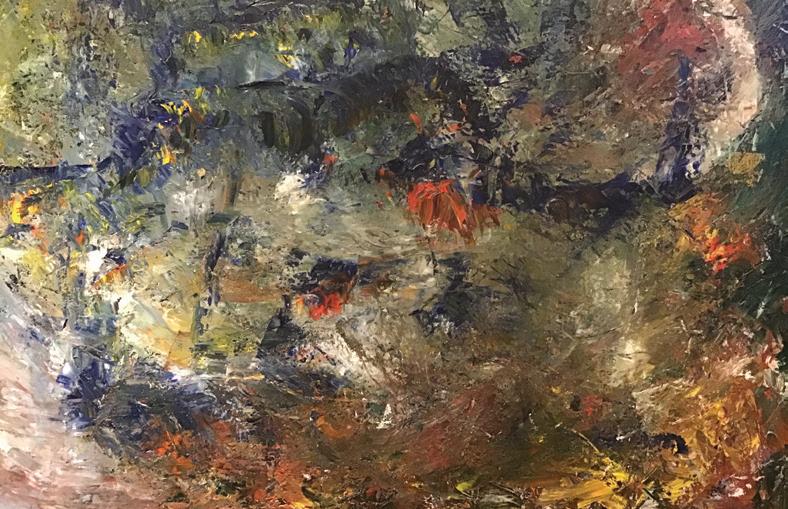
68
Gone Midnight
Gone midnight
ey should be back e unexplained in pasted sweat
Children forfeited to the wind
Scattered seeds on winter soil
Around my heart that pounds so full
Enduring none but the cruel No space, no forgiveness
Blame or sure
Or fond denial
And when distorted memory bleak at ran unthinkable ights of pain Rocks on numb bodies
All feelings now Vomit before the dawn
69
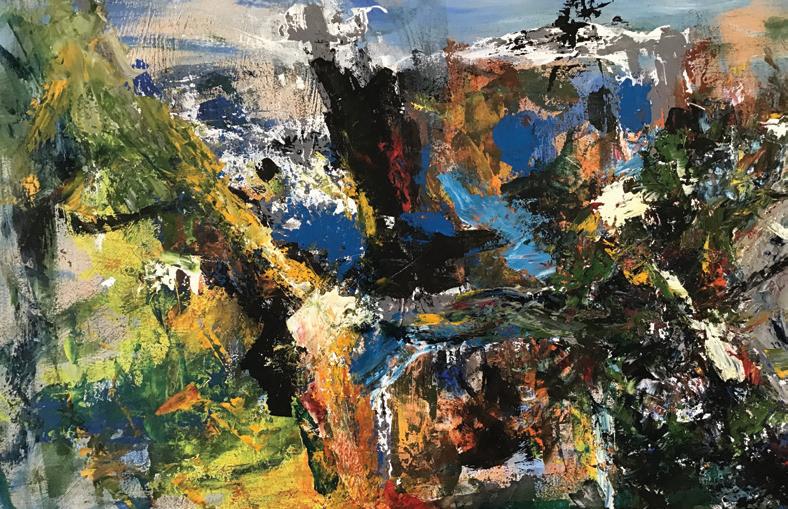
70
Adrift
We may as well let go today
No truth can shame us for sitting herefaultlessly Adrift
Accept my helpless yawn and your discerning sigh
Asyourface leans into your hand
Soft echoes in the mind
We contemplate our break So completelyleft behind.
In this land we Phantom meditate
Repeat redoubled doubt
Poise and the unspoken Ease gently
Towards the shock
71
Just a Body
warted under heavy dreams
e past a giant ember, blots out all the stars
Deep indecayed memory
Of helpless years gone by I am just a body
Barely breathing on unformed terrain
e elds are burnt
e trees are felled is is no man's land with no faith
No bunker from the withering re Hope surges inwards
Our eyes are full of rocks
For tears that cannot pass
72
Protect us
Protect us warm and snug
From the new,
e ruination of specialness
e betrayal of love
To trust in one another
Change is such a dangerous course
Where need was lost before
e rst time that sweet milk was rancid
When mother loved a surly bulk
And pushed me on a wobbly log
Far out to the lonely sea
And now I sit in sheltered sands
Such strangers this way come
To drop their litter on the beach
And ruin this ne land.
73
Alienation and Perversion
Alienation and Perversion
Came down to the group today
We’d hoped it was a book forgotten
To keep the truth at bay
e raging mob must be a shadow
Greek Myth, Snow White and Peter Pan
Save us love of childhood bliss!
One last disguise, perhaps a kiss
I’m now a patient not a man
It was our group from you I ran.
74
Dreams
She laid upon a woman and cried the tears of sex
e black clouded bridge of hope that fell upon her mother’s house
Her partners children in poison pooled
An auditory allegory of angry that trips upon the fray, And as we move around our seats our hairs are turning grey.
Sisters we love you although we do not know you, Unless in strange apperception wrought e blinding colours of a bomb and death that joins us all.
Pause for the men, Oh pause for the men and let us see their trembling gaiety,
Goodbye upon the crowded guilt, I seldom want to contemplate, the faceless woman all bathed in blood
A child of Dante’s past
And the old book of life’s dominion get superseded by no opinion. Relieve us of this nightmare world!
Let’s drift upon the play I’ve never seen, e brothers love of pastures green
But still the sheep was murdered there.
In life’s regrets an hour was lost
And never can it be,
Yet long dispersed we dream again of naked mothers in the shower and king parades like David Gower.
75
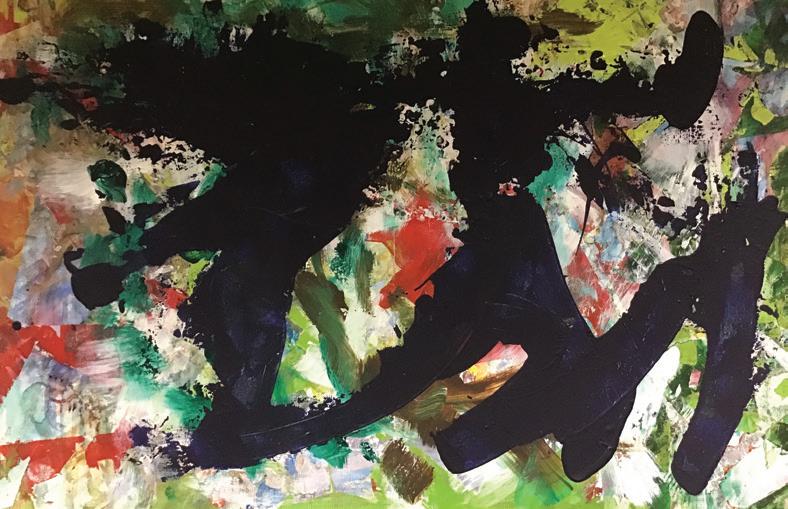
76
Shocked
Have you beenthere?
Down the hill to the river and the bombed-out town Hell shaped shaken and split.
To shrink from the architectural ruin to dreams thatscream in the giant hall Mechanical esh and death to all.
Spines too weak to lift the co n Fingers too limp to pick the lock As bejewelledspiders our party block We think no more throughfear and shock.
77
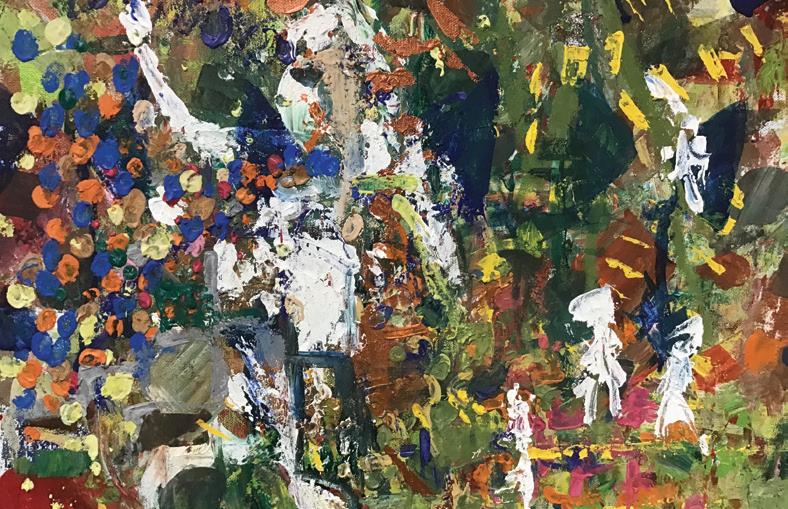
78
Birds
Gardener of such strange delights
Nimbly tread on this new ground
Where tiny birds just might be found
Fragile birth
Scratched from the rhythm of indecision
Preserved in the curves and rumps of naked elds
Where poets seek a whispered truth
And farmers dream of super yields
What can we muster for this short time?
Obeyance to the wrestling rhyme
Our nature
Dimmed and fraught
On ursday nights between our doors
As funerals pass
Our limp applause
79
cont ...
e gaping disbelief
Of choices that fell upon a gentle breeze And disappeared into the trees
Tremulous as those fallen birds
Our language its on lonely ground
When life and death just might be found.
80
The Clinker
Dry in shame the clinker sits
Beneath the ground its builders earned a pretty scene its broken hull beyond their dream.
Once the river lapped your sides and now that saplings soar no rowlock and oar can pride your streamline bows.
e River winds by, Its banks remember you and ood to say goodbye.
81
82
References
Dalal, F., (2019) CBT: e Cognitive Behavioural Tsunami: Managerialism, Politics and the Corruptions of Science. Routledge Taylor and Francis: London.
Freud, S., (1915d). ‘Repression’, Gay, P., e Freud Reader, Vintage: New York (1995: 568-572)
Freud, S., (1900). e Interpretation of Dreams (translated and edited by Strachey, J., 1955, Basic Books: New York.
Kingsley, P., (1995). Ancient Philosophy Mystery and Magic, Empedocles and e Pythagorean Tradition. Clarendon Paperbacks: Oxford. Winnicott, D. W., (2011). ‘ e AntiSocial Tendency’, Deprivation and Delinquency, Routledge: London
83
84 Morning Sky Dead Men e Face e Oak Teachers Certi cate Presentation Breakfast Bagpipes A Day Art Matures To Sleep E gy Under e Same Sky Our Eyes Meet e Golden Mushroom Old Age Death Death Carry Me When I Wake Up e Short Corridor of Time Monument Exile Birth Tilt Me Forward 4 5 6 7 8 11 12 13 15 17 19 21 22 23 25 27 29 31 33 35 37 39 41 43 44 Inclinato In Avanti Despair Forbidden Tears Hypno Biker Raw Material Baptism Puddle Cry to Sleep Darling North eld Hospital Guilt Love Subordination O the Trolley ey Took Her On Mountain Steep Gone Midnight Adrift Just a Body Protect Us Alienation and Perversion Dreams Shocked Birds e Clinker 45 47 48 49 51 53 55 56 57 58 59 60 61 63 65 67 69 71 72 73 74 75 77 79 81
of Poems by Title
Order
List
of Paintings
Asleep on e Volcano
Phoenix
Village Institution
e Wood
Tsunami
e Fall
Carry Me
When I wake up
Spirits
Monument
Exile
Interstellar
Zoom
e Cave
Polar Moon
O the Trolley
ey
e
Assassination
85
Took Her
Sheep
Boats
Gone Midnight
Gardener Cover 2 14 20 24 28 30 32 34 36 38 40 42 46 52 54 62 64 66 68 70 76 78
Marcus Price is a Psychotherapist who lives in the English county of Kent.
He studied Psychoanalytic Psychotherapy at e University of Kent at Canterbury, Group Analysis at the Institute of Group Analysis and Clinical Supervision at the Society of Analytical Psychology.
He has a life-long interest in painting and writing poems although has never formally studied either. He is a member of the Group Analytic Society International and former poetry editor of their newsletter ‘Contexts’. He is the founder of e Experiential Psychotherapy Initiative Community, a psychotherapist cooperative that o ers a ordable professional development courses for healthcare workers.
87
End paper on uncoated white paper (blank)
End paper on uncoated white paper (blank)
End paper on uncoated white paper (blank)






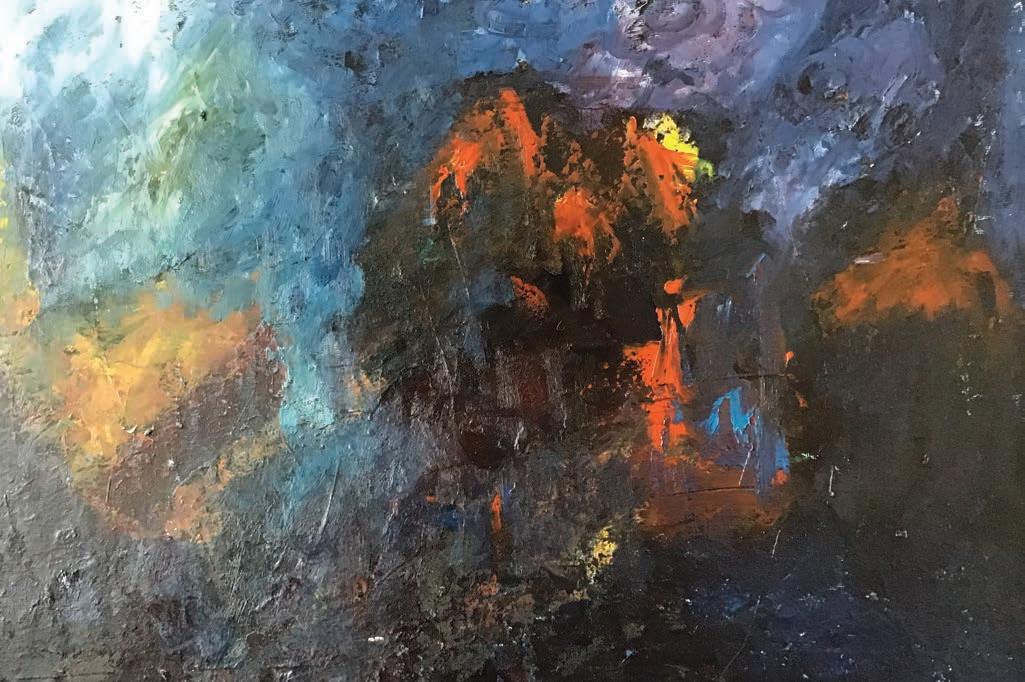
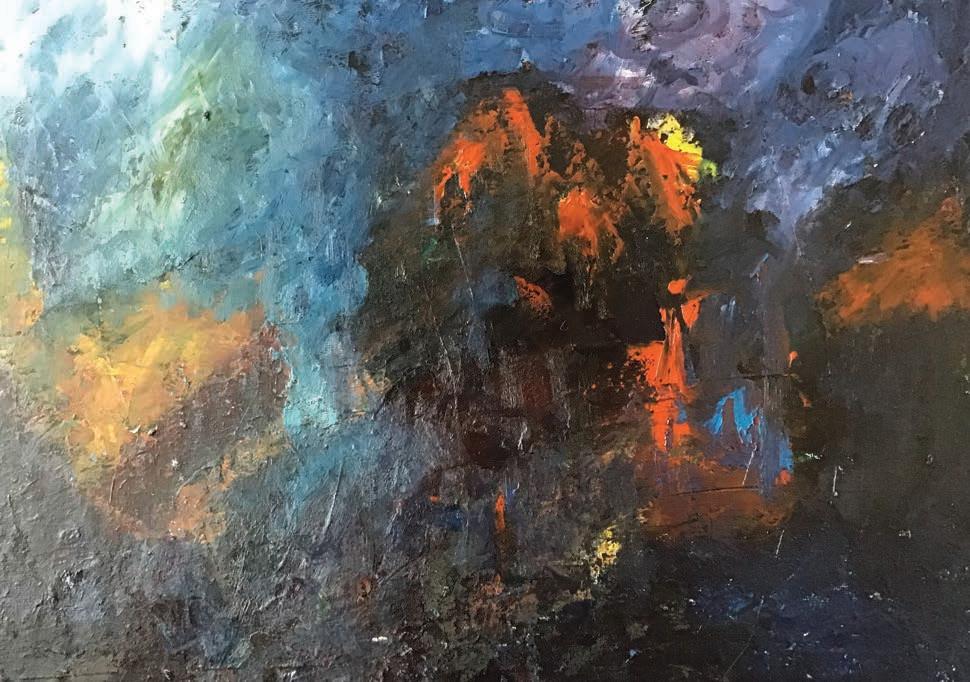
Asleep on the Volcano The Poetic Landscape of Psychotherapy Marcus Price Marcus Price Asleep on the Volcano The Poetic Landscape of Psychotherapy 9781 838136901 ISBN: 978-1-8381-3690-1 RRP £29.99 Asleep on the Volcano is a melting pot of poetry, painting and psychotherapy. It depicts the authors own essential disturbance and recovery from working with persons who have su ered injuries of the mind.





























